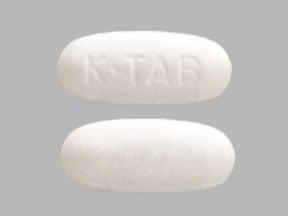
Potassium Chloride ER Coupons & Savings Card – Discount Prices from $10.79
Generic for: K-tab, Klor-con 10, Klor-con
My prescription
Edit
20MEQ, Potassium Chloride ER (90 Tablet Extended Releases)
Select pharmacy

CVS
$37.49
COUPON PRICE
Walgreens
$10.79
COUPON PRICE
Albertsons
$18.95
COUPON PRICE
Walmart
$36.16
COUPON PRICEPotassium Chloride ER savings card
Show this card to your pharmacist
Walgreens
$10.79
BIN
ID
PCN
GRP
015995
LHKPY243661
GDC
DR33
Powered by
More prescriptions for hypokalemia
More prescriptions for hypokalemia
Price history for Klor-con (brand) & Potassium Chloride ER (generic)
90 Tablet Extended Releases, 10MEQ
Average retail price for Klor-con
Average retail price for Potassium Chloride ER
Average SaveHealth price for Potassium Chloride ER
Our price history data is based on aggregated prescription data collected from participating pharmacies in America. Our prescription data updates daily to reflect the latest price changes. If you notice a missing data point, it means there wasn't sufficient data available to generate a monetary value for that date.
We analyzed Potassium Chloride ER prices for (10MEQ, 30 Tablet Extended Releases) over the last 12 months. The average retail price was $67.19, while the average price using the SaveHealth discount card was $12.80. That's a savings of approximately 80.95% when using our Potassium Chloride ER coupon.
Compared to the generic version, Klor-con had an average price of $42.29 over the same time period. With the SaveHealth savings card, Potassium Chloride ER is 69.73% cheaper on average than Klor-con.
*Retail prices are based on pharmacy claims data, and may not be accurate when we don't have enough claims.
Potassium Chloride ER dosage forms
Dosage Quantity Price from Per unit 8MEQ 30 Tablet Extended Releases $7.03 $0.23 8MEQ 60 Tablet Extended Releases $11.56 $0.19 8MEQ 90 Tablet Extended Releases $22.58 $0.25 8MEQ 100 Tablet Extended Releases $24.09 $0.24 8MEQ 120 Tablet Extended Releases $27.11 $0.23 8MEQ 180 Tablet Extended Releases $33.72 $0.19 8MEQ 500 Tablet Extended Releases $46.90 $0.09 8MEQ 1000 Tablet Extended Releases $67.50 $0.07 10MEQ 1 Tablet Extended Release $2.62 $2.62 10MEQ 4 Tablet Extended Releases $3.00 $0.75
| Dosage | Quantity | Price from | Per unit |
|---|---|---|---|
| 8MEQ | 30 Tablet Extended Releases | $7.03 | $0.23 |
| 8MEQ | 60 Tablet Extended Releases | $11.56 | $0.19 |
| 8MEQ | 90 Tablet Extended Releases | $22.58 | $0.25 |
| 8MEQ | 100 Tablet Extended Releases | $24.09 | $0.24 |
| 8MEQ | 120 Tablet Extended Releases | $27.11 | $0.23 |
| 8MEQ | 180 Tablet Extended Releases | $33.72 | $0.19 |
| 8MEQ | 500 Tablet Extended Releases | $46.90 | $0.09 |
| 8MEQ | 1000 Tablet Extended Releases | $67.50 | $0.07 |
| 10MEQ | 1 Tablet Extended Release | $2.62 | $2.62 |
| 10MEQ | 4 Tablet Extended Releases | $3.00 | $0.75 |
| 10MEQ | 15 Tablet Extended Releases | $4.37 | $0.29 |
| 10MEQ | 20 Tablet Extended Releases | $5.00 | $0.25 |
| 10MEQ | 30 Tablet Extended Releases | $6.24 | $0.21 |
| 10MEQ | 40 Tablet Extended Releases | $7.49 | $0.19 |
| 10MEQ | 45 Tablet Extended Releases | $8.11 | $0.18 |
| 10MEQ | 60 Tablet Extended Releases | $9.99 | $0.17 |
| 10MEQ | 80 Tablet Extended Releases | $16.50 | $0.21 |
| 10MEQ | 90 Tablet Extended Releases | $20.23 | $0.23 |
| 10MEQ | 100 Tablet Extended Releases | $21.48 | $0.21 |
| 10MEQ | 120 Tablet Extended Releases | $23.97 | $0.20 |
| 10MEQ | 180 Tablet Extended Releases | $31.19 | $0.17 |
| 10MEQ | 200 Tablet Extended Releases | $32.99 | $0.17 |
| 10MEQ | 270 Tablet Extended Releases | $37.42 | $0.14 |
| 10MEQ | 360 Tablet Extended Releases | $41.13 | $0.11 |
| 10MEQ | 500 Tablet Extended Releases | $46.90 | $0.09 |
| 10MEQ | 540 Tablet Extended Releases | $48.55 | $0.09 |
| 10MEQ | 1000 Tablet Extended Releases | $67.50 | $0.07 |
| 15MEQ | 30 Tablet Extended Releases | $6.77 | $0.23 |
| 15MEQ | 100 Tablet Extended Releases | $66.86 | $0.67 |
| 20MEQ | 90 Tablet Extended Releases | $29.56 | $0.33 |
| 20MEQ | 30 Tablet Extended Releases | $11.55 | $0.39 |
| 20MEQ | 60 Tablet Extended Releases | $18.60 | $0.31 |
| 20MEQ | 100 Tablet Extended Releases | $31.18 | $0.31 |
| 20MEQ | 500 Tablet Extended Releases | $88.45 | $0.18 |
